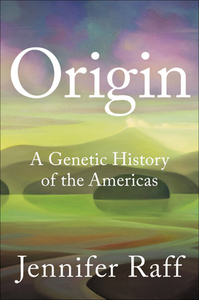Take a photo of a barcode or cover
challenging
informative
reflective
fast-paced
informative
inspiring
lighthearted
reflective
medium-paced
informative
informative
reflective
slow-paced
adventurous
hopeful
informative
inspiring
slow-paced
"Origin is the story of who the first peoples in the Americas were, how and why they made the crossing, how they dispersed south, and how they lived based on a new and powerful kind of evidence: their complete genomes."
This is an interesting book exploring the accepted scholarship about the peopling of the Americas. It can be scientifically dense at times but it's the math equivalent of "show your work" and helps the reader understand how the science has changed over time.
Ultimately it's a lot of speculation. Genetic analysis has helped. I wonder if past cultures - 10s of thousands of years ago - had hot air balloons. Why not? Just cuz there's no archaeological evidence doesn't mean it didn't happen. Not everything survives that long. People might have discovered natural gas and made use of it. They certainly could have witnessed an electric eel and figured out a way to harness that electricity. We act like people were stupid in the past - what if they were just as smart as us?
This is an interesting book exploring the accepted scholarship about the peopling of the Americas. It can be scientifically dense at times but it's the math equivalent of "show your work" and helps the reader understand how the science has changed over time.
Ultimately it's a lot of speculation. Genetic analysis has helped. I wonder if past cultures - 10s of thousands of years ago - had hot air balloons. Why not? Just cuz there's no archaeological evidence doesn't mean it didn't happen. Not everything survives that long. People might have discovered natural gas and made use of it. They certainly could have witnessed an electric eel and figured out a way to harness that electricity. We act like people were stupid in the past - what if they were just as smart as us?
I really enjoyed learning about the integration of anthropological and pure biological research. I've got a purely technical background and my social studies interest is purely personal so there are loads of considerations and conventions that I would not have considered such as needed community support instead of individual support for genetic testing. Just as interesting were the many research conventions that were flubbed for centuries that I would have considered common sense or basic human decency. It did get repetitive at a few points in emphasizing the importance of respecting cultures which may not have translated as well to audiobook and dulled the impact but I'd rather an anthropologist tell me too much to respect cultures rather than too little.
4.5 stars. This wasn't transformative for me – although it might have been if I'd encountered it earlier – but it's so well-written on so many fronts that I don't want to give it 4 stars.
Despite the title, this book also gives a solid overview of the archeological history, which is welcome, since any account that reconciles genetic and archeological evidence is much stronger than an account that relies on one alone.
Of all the ancient genetics pop-sci material I've consumed, this is by far the most clear on what collaborating with indigenous groups looks like. This part may seem excessive to people who are first encountering ancient genetics, but I personally am grateful to have any model better than "I can't get the mean indigenous people to give up their DNA :("...an approach I've unfortunately seen before.
It's also lucid on the historiography without spending too much timing bashing Clovis-first (it does spend a little bit of time bashing Clovis-first. To be fair, they kinda deserve it.)
As fun as the big labs' publications can be, I'm glad that people like Jennifer Raff are working in this field.
Sidenote: The first denigration I ever heard of Clovis-first was from my linguistics professor, and even though I've seen a ton of people piling on Clovis-first I've literally never heard his criticism from anyone else. He taught us some basic rules of historical linguistics - here the relevant rule is "a language family probably originated where it has the most variety, or at least has existed there the longest", cf. the diversity of Bantu languages in West Africa. Then he pointed to a map of language families in the Americas, where there was a lot more diversity along the West Coast. (Granted, these are language families with no proven relation – but given how the Americas were settled, they probably are related). Then he said, where do you think people went first? The coast or the interior? And of course, we said the coast. Now the genetic evidence points that way too – but no one has brought up this linguistic argument. Is it real? Did he lie to us? John McWhorter, what is the truth??
Despite the title, this book also gives a solid overview of the archeological history, which is welcome, since any account that reconciles genetic and archeological evidence is much stronger than an account that relies on one alone.
Of all the ancient genetics pop-sci material I've consumed, this is by far the most clear on what collaborating with indigenous groups looks like. This part may seem excessive to people who are first encountering ancient genetics, but I personally am grateful to have any model better than "I can't get the mean indigenous people to give up their DNA :("...an approach I've unfortunately seen before.
It's also lucid on the historiography without spending too much timing bashing Clovis-first (it does spend a little bit of time bashing Clovis-first. To be fair, they kinda deserve it.)
As fun as the big labs' publications can be, I'm glad that people like Jennifer Raff are working in this field.
Sidenote: The first denigration I ever heard of Clovis-first was from my linguistics professor, and even though I've seen a ton of people piling on Clovis-first I've literally never heard his criticism from anyone else. He taught us some basic rules of historical linguistics - here the relevant rule is "a language family probably originated where it has the most variety, or at least has existed there the longest", cf. the diversity of Bantu languages in West Africa. Then he pointed to a map of language families in the Americas, where there was a lot more diversity along the West Coast. (Granted, these are language families with no proven relation – but given how the Americas were settled, they probably are related). Then he said, where do you think people went first? The coast or the interior? And of course, we said the coast. Now the genetic evidence points that way too – but no one has brought up this linguistic argument. Is it real? Did he lie to us? John McWhorter, what is the truth??
5/10
There was a lot of interesting info presented, but it was pretty dense. Geneticists probably love this
There was a lot of interesting info presented, but it was pretty dense. Geneticists probably love this
challenging
informative
inspiring
medium-paced



